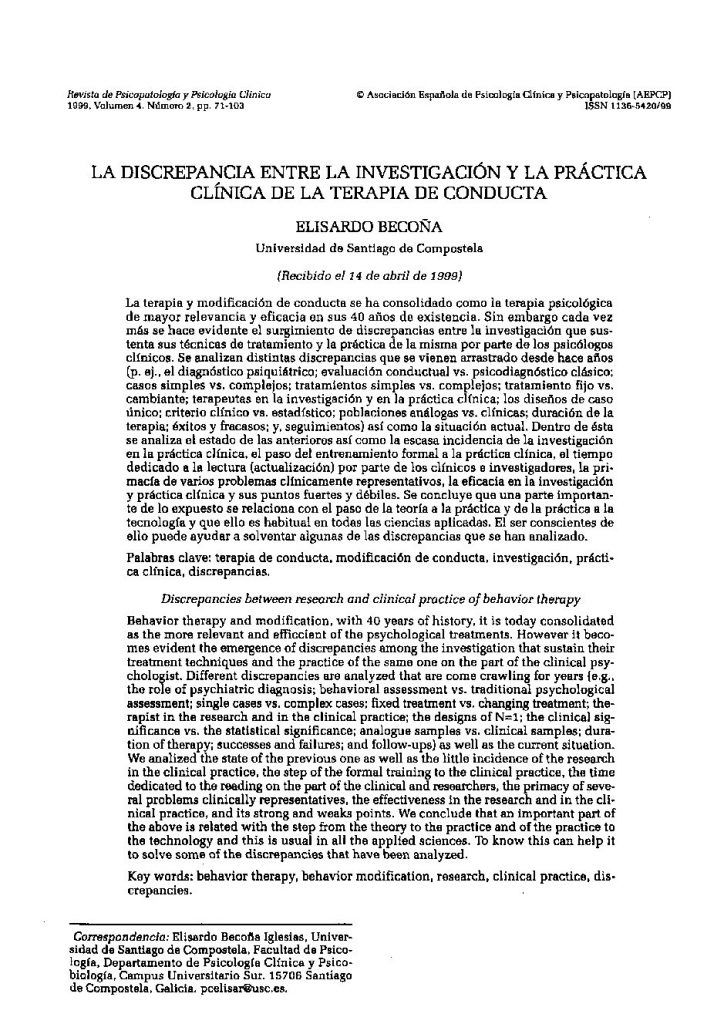La discrepancia entre la investigación y la práctica clínica de la terapia de conducta.

- La discrepancia entre la investigación y la práctica clínica de la terapia de conducta.
- Estructura factorial de la Escala de Ansiedad Social para Niños-Revisada (SASC-R).
- Las recaídas en el juego patológico: Un estudio de las situaciones precipitantes.
- Precursores conductuales infantiles de los trastornos del espectro esquizofrénico: esquizofrenia y trastorno esquizotípico de la personalidad.
- Enrique Echeburúa (1999): ¿Adicciones sin drogas? Las nuevas adicciones: Juego, sexo, comida, compras, trabajo, internet. Bilbao: Desclée de Brouwer.
Behavior therapy and modification, with 40 years of history, it is today consolidated as the more relevant and efficient of the psychological treatments. However it becomes evident the emergence of discrepancies among the investigation that sustain their treatment techniques and the practice of the same one on the part of the clinical psychologist. Different discrepancies are analyzed that are come crawling for years (e.g., the role of psychiatric diagnosis; behavioral assessment vs. traditional psychological assessment; single cases vs. complex cases; fixed treatment vs. changing treatment; therapist in the research and in the clinical practice; the designs of N=1; the clinical significance vs. the statistical significance; analogue samples vs. clinical samples; duration of therapy; successes and failures; and follow-ups) as well as the current situation. We analyzed the state of the previous one as well as the little incidence of the research in the clinical practice, the step of the formal training to the clinical practice, the time dedicated to the reading on the part of the clinical and researchers, the primacy of several problems clinically representatives, the effectiveness in the research and in the clinical practice, and its strong and weaks points. We conclude that an important part of the above is related with the step from the theory to the practice and of the practice to the technology and this is usual in all the applied sciences. To know this can help it to solve some of the discrepancies that have been analyzed.
La terapia y modificación de conducta se ha consolidado como la terapia psicológica de mayor relevancia y eficacia en sus 40 años de existencia. Sin embargo cada vez más se hace evidente el surgimiento de discrepancias entre la investigación que sustenta sus técnicas de tratamiento y la práctica de la misma por parte de los psicólogos clínicos. Se analizan distintas discrepancias que se vienen arrastrado desde hace años (ej., el diagnóstico psiquiátrico; evaluación conductual vs. psicodiagnóstico clásico; casos simples vs. complejos; tratamientos simples vs. complejos; tratamiento fijo vs. cambiante; terapeutas en la investigación y en la práctica clínica; los diseños de caso único; criterio clínico vs. estadístico; poblaciones análogas vs. clínicas; duración de la terapia; éxitos y fracasos; y, seguimientos) así como la situación actual. Dentro de ésta se analiza el estado de las anteriores así como la escasa incidencia de la investigación en la práctica clínica, el paso del entrenamiento formal a la práctica clínica, el tiempo dedicado a la lectura (actualización) por parte de los clínicos e investigadores, la primacía de varios problemas clínicamente representativos, la eficacia en la investigación y práctica clínica y sus puntos fuertes y débiles. Se concluye que una parte importante de lo expuesto se relaciona con el paso de la teoría a la práctica y de la práctica a la tecnología y que ello es habitual en todas las ciencias aplicadas. El ser conscientes de ello puede ayudar a solventar algunas de las discrepancias que se han analizado.



